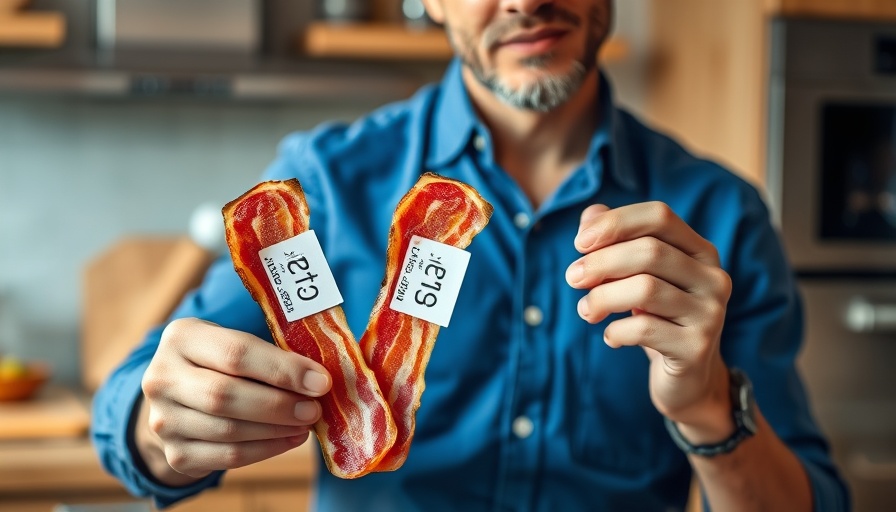
Understanding the True Cost of Bacon
For many, bacon is not just a food item; it’s a culinary delight that stirs emotions and memories. However, as you've likely noticed during your shopping trips, the price of bacon can vary significantly, leading to a key question: is expensive bacon really worth it? When sifting through choices that range from just a few dollars to an extraordinary $283 per pound, one must consider not just the price but what lies behind these figures.
In 'Is $283 Bacon That Much Better for You?', the discussion explores the nuances of bacon quality, prompting us to break down its true value and health implications.
The Journey of Commercial Bacon
The majority of bacon available in grocery stores originates from factory farms. Here, pigs live in cramped conditions, often in spaces no larger than a bathtub, fed a diet primarily consisting of genetically modified corn and soy. This method aims solely at rapid weight gain through questionable practices, including the use of drugs like ractopamine—substances banned in many countries due to health concerns.
Unfortunately, consumers are often unaware of these farming practices, which raises ethical questions about the food they consume. Low prices can be tempting, but they often conceal a darker side of agricultural methods that jeopardize animal welfare and potentially human health.
The Advantages of Pasture-Raised Bacon
Contrast this grim scenario with pasture-raised bacon, where animals are treated humanely, allowed to roam in open spaces, improving their overall health and nutritional profile. For example, farmers like John Arbuckle at Singing Pastures apply regenerative farming techniques that not only support animal welfare but also enhance flavor and nutrition, yielding better meat products. These pigs feed on natural diets, which can include acorns in regions like Spain and Italy, leading to superior tastes and higher nutrient density.
Breaking Down Nutrients: Is More Expensive Bacon Healthier?
Not all bacon is created equal, especially when comparing pasture-raised options to their factory-farmed counterparts. Pasture-raised bacon is rich in omega-3 fatty acids, vitamins like B1 and D, and essential minerals, making it a more nutrient-dense choice. By choosing higher-quality bacon, you're not just opting for better taste; you're also investing in your health.
Moreover, the fat in properly raised pork lacks harmful elements that often accompany mass-produced varieties. The unhealthy fats sparingly found in supermarket bacon can lead to various health issues, but pasture-raised options offer healthier lard that can be included in cooking without as many health worries.
Cooking Bacon the Right Way
Regardless of the type of bacon you choose, the method of preparation can significantly influence health outcomes. Overcooking bacon can produce carcinogenic compounds, which is why techniques like baking or using an air fryer may be superior. Additionally, consider cooking bacon with garlic or onions to counteract carcinogens, making your meal not only enjoyable but also less harmful.
As you navigate through your culinary journey, the environment in which bacon is cooked is equally important. Avoid microwaving bacon, as this can produce harmful chemical reactions that should be avoided for optimal health.
Connecting with Local Farmers
Supporting local farmers who prioritize humane practices is paramount in shifting toward a healthier food system. Engaging with farmers at local markets can connect you to healthier options, ensuring that you know where your food comes from and how it's raised.
In Louisiana, where community ties run deep, supporting local growers not only fosters community spirit but promotes better health choices among consumers. Taking these extra steps could significantly influence your well-being and the environment.
Informed Choices Lead to Healthier Living
Understanding the complexities behind bacon—from its sources and nutritional advantages to the cooking methods that preserve health—is vital to making informed decisions. As you dive deeper into the world of food, remember that not all bacon is created equal.
In summary, the choices we make about food connected profoundly to our health and well-being. The next time you’re at the store, consider the implications of your bacon purchase. Look for options that reflect your values, prioritize humane farming practices, and ultimately contribute to a healthier lifestyle.
For those who wish to further explore nutrition and healthy eating, the next step involves examining other staple foods like eggs and their nutritional benefits—stay tuned for insights that extend your understanding of wholesome foods!
 Add Row
Add Row  Add
Add 



Write A Comment